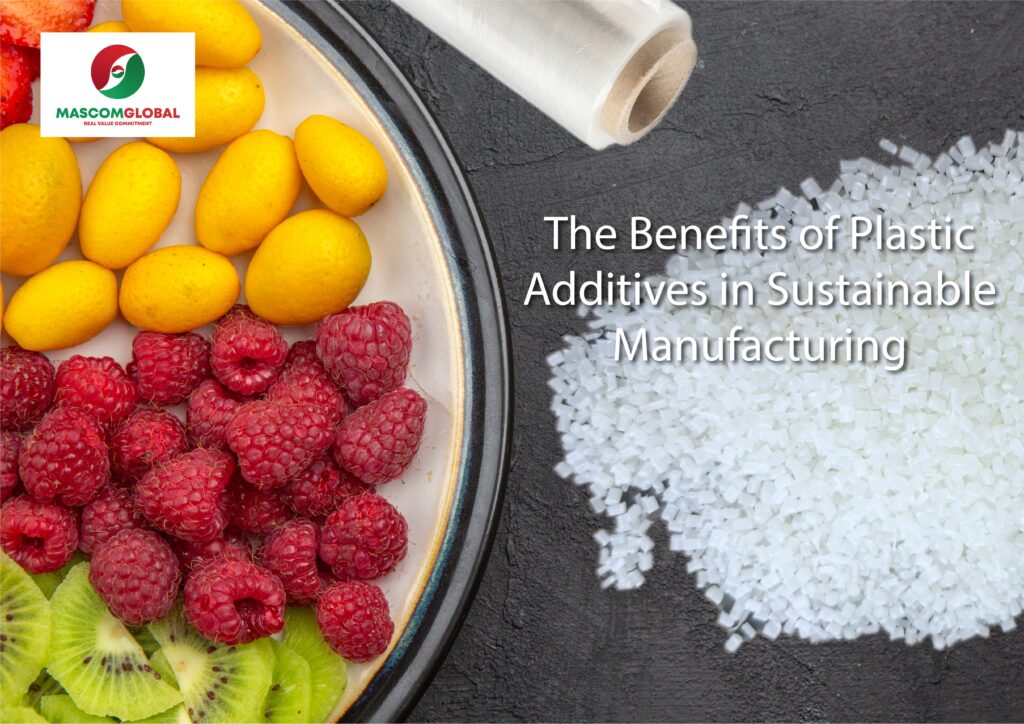Exploring the Benefits of Plastic Additives in Sustainable Manufacturing: Extending Product Life, Optimizing Processes, Supporting Recycling, and Protecting the Environment.
The Benefits of Plastic Additives in Sustainable Manufacturing
In modern industry, sustainable manufacturing is crucial for reducing waste, saving energy, and protecting the environment. Plastic additives play a key role in enhancing product performance and production efficiency while supporting the development of a circular economy.
I. WHAT ARE PLASTIC ADDITIVES?
Plastic additives are substances added to plastics during production to improve their physical, chemical, and aesthetic properties. They help plastics meet strict requirements in terms of:
- Strength, durability, and load-bearing capacity
- Color and appearance
- Heat resistance, flame retardancy, and UV protection
Common types of plastic additives include:
- Color masterbatches
- Antioxidants and UV stabilizers
- Plasticizers or stiffening agents
- Flame retardants
- Anti-block agents
- Optical Brightener OB-1 urgents
- Dessicant agents,…
Thanks to these additives, plastics not only achieve high quality but also reduce production scrap and waste.

1. Extending Product Life with Plastic Additives
One of the most significant benefits of plastic additives is prolonging product lifespan:
- Antioxidants: Prevent plastics from becoming brittle over time
- UV stabilizers: Protect plastics from fading and cracking due to sun exposure
This results in more durable products, reducing replacement frequency and plastic waste, thereby contributing to environmental protection.
2. Optimizing Production Efficiency
Plastic additives help improve production efficiency by:
- Flow and thermal stabilizers: Make plastics easier to process, reducing defects in injection molding, extrusion, or film blowing
- Color masterbatches: Ensure uniform color, minimizing scrap due to color inconsistencies
Higher production efficiency means lower energy and material consumption, enhancing sustainability in manufacturing.

3. Reducing Environmental Impact
Some plastic additives are designed to be environmentally friendly:
- Biodegradable additives: Help plastics decompose or be recycled more easily
- Eco-stabilizers: Prevent the release of harmful chemicals during production
Using environmentally friendly plastic additives enables businesses to reduce emissions, waste, and pollution while promoting a green, circular economy.
4. Supporting Plastic Recycling
Plastic additives play an important role in improving the quality of recycled plastics:
- Thermal stabilizers: Allow recycled plastics to withstand heat during extrusion or molding without degrading
- Color masterbatches: Provide uniform color for recycled plastics, increasing market value
As a result, recycled plastics can be reused multiple times, reducing dependence on virgin materials.
5. Reducing Costs and Waste
Although plastic additives require an initial investment, they offer long-term benefits:
- Reduce scrap and defective products
- Lower maintenance costs through anti-wear additives
- Reduce the cost of product replacement
Thus, plastic additives optimize economic benefits while contributing to sustainable manufacturing.
6. Creating High-Quality, Multi-Functional Plastic Products
Plastic additives help create high-performance, multi-functional products:
- Heat-resistant and flame-retardant plastics for electronic devices
- UV-resistant plastics for outdoor construction materials
- Impact-resistant and elastic plastics for automotive and packaging applications
These products can replace traditional heavy materials, reducing energy and resource consumption and promoting long-term sustainability.

7. Moving Towards a Circular Economy
In a circular economy, plastic additives support designing products that are easy to recycle or reuse:
- Plastics retain mechanical properties and color after multiple recycling cycles
- Reduce plastic waste and increase the value of secondary materials
Therefore, plastic additives are essential in sustainable manufacturing strategies and green development.
MASCOM GLOBAL JSC is leading masterbatch and compound manufacturer of high quality in Vietnam, with the fastest growth rate in the industry. We manufacture a wide range of Filler Masterbatch, Color Masterbatch, Additives Masterbatch, PVC Compound and export them to over 70 countries around the world.
II. CONCLUSION
Using plastic additives is a smart solution for sustainable manufacturing. They help:
- Extend product life and reduce waste
- Optimize production processes, saving energy and materials
- Support recycling and increase the value of recycled plastics
- Reduce environmental impact with eco-friendly additives
- Create high-quality, multi-functional plastic products
With their crucial role in sustainable plastic production, plastic additives are the key for businesses to balance economic benefits with environmental responsibility.

